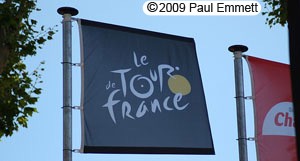 The 2010 Tour de France route has been announced by organizer ASO and it’s a fitting one for the 100th anniversary of Pyrenees’ inclusion. Starting in Rotterdam and ending in Paris on the Champs-Elysées, the race takes place from July 3 – 25. Besides the prologue, there is only one time trial of 51 kilometers.
The 2010 Tour de France route has been announced by organizer ASO and it’s a fitting one for the 100th anniversary of Pyrenees’ inclusion. Starting in Rotterdam and ending in Paris on the Champs-Elysées, the race takes place from July 3 – 25. Besides the prologue, there is only one time trial of 51 kilometers.
The Pyrenees were first included in 1910, when Henri Desgrange had staff member Alphonse Steines explore the region. Steines got lost, had to deal with bears, but made it and told Desgrange: “Pyrenees perfectly usable.”
In 2010, things won’t be as wild, as gearing and pavement will make it easier on the riders. Still, 12 mountains in the Pyrenees will mostly likely make a climber the Tour de France king next time.
At the heart of the route is the Col du Tourmalet which will feature during the 17th stage and then as the stage finish a day later. The first rider ever over the top was Octave Lapize, in July 1910. His less than flattering words (“You are murderers!”) towards the organizers will unlikely be heard this summer, although some may think that way.
The Pyrenees are preceded by the Alps, which will be less decisive than in some previous years and there won’t be any Alpe d’Huez.
The top three of the 2009 event were in attendance, with second-placed Andy Schleck seated between winner Alberto Contador and Lance Armstrong, to separate the former teammates.
Armstrong showed no signs of emotions when a clip was played to introduce the stage into Gap. The clip showed the crash of Jesoba Beloki on the descent into Gap, followed by Armstrong’s famous ride through the fields. The clip was animated by Paul Sherwen’s commentary.
Richard Virenque, the French darling and king of the mountains in the 90’s, was quite excited about the route. “The start in Rotterdam is fantastic, although some of the favorites may lose some time on the cobbles in Belgium in the first days.”
The terrain made his eyes light up in excitement. “Morzine will be interesting. This is really a course for the climbers, with 12 mountains in the Pyrenees.” He also welcomed the inclusion of the Tourmalet. “It’s a legend, but doing it twice is just extraordinary.”
Joop Zoetemelk, winner of the 1980 Tour, was in attendance as an official representation for the Dutch/Belgium start. Four stages will be held in the Netherlands, from the prologue in Rotterdam over to neighboring Belgium.
More details on the route to follow on Velonation.
July 3 Prologue: Rotterdam – Rotterdam 8 km
July 4 Stage 1: Rotterdam – Bruxelles 224 km
July 5 Stage 2: Bruxelles – Spa 192 km
July 6 Stage 3: Wanze – Arenberg Porte du Hainaut 207 km
July 7 Stage 4: Cambrai – Reims 150 km
July 8 Stage 5: Épernay – Montargis 185 km
July 9 Stage 6: Montargis – Gueugnon 225 km
July 10 Stage 7: Tournus – Station des Rousses 161 km
July 11 Stage 8: Station des Rousses – Morzine-Avoriaz 189 km
July 12 Rest Day: Morzine-Avoriaz
July 13 Stage 9: Morzine-Avoriaz – Saint-Jean-de-Maurienne 204 km
July 14 Stage 10: Chambéry – Gap 179 km
July 15 Stage 11: Sisteron – Bourg-lès-Valence 180 km
July 16 Stage 12: Bourg-de-Péage – Mende 210 km
July 17 Stage 13: Rodez – Revel 195 km
July 18 Stage 14: Revel – Ax-3 Domaines 184 km
July 19 Stage 15: Pamiers – Bagnères-de-Luchon 187 km
July 20 Stage 16: Bagnères-de-Luchon – Pau 196 km
July 21 Rest Day: Pau
July 22 Stage 17: Pau – Col du Tourmalet 174 km
July 23 Stage 18: Salies-de-Béarn – Bordeaux 190 km
July 24 Stage 19: Bordeaux – Pauillac 51 km
July 25 Stage 20: Longjumeau – Paris Champs-Élysées 105 km